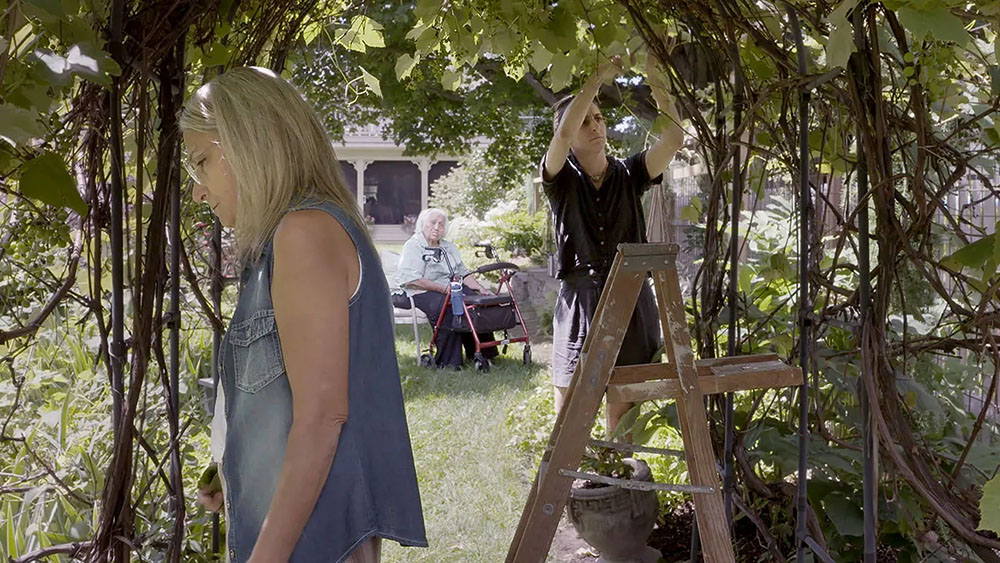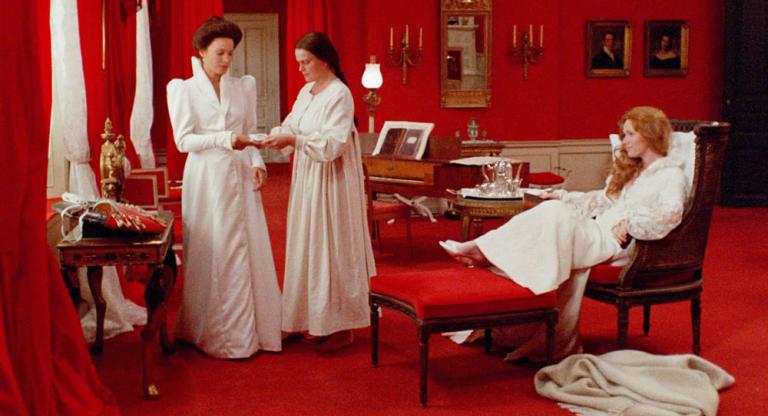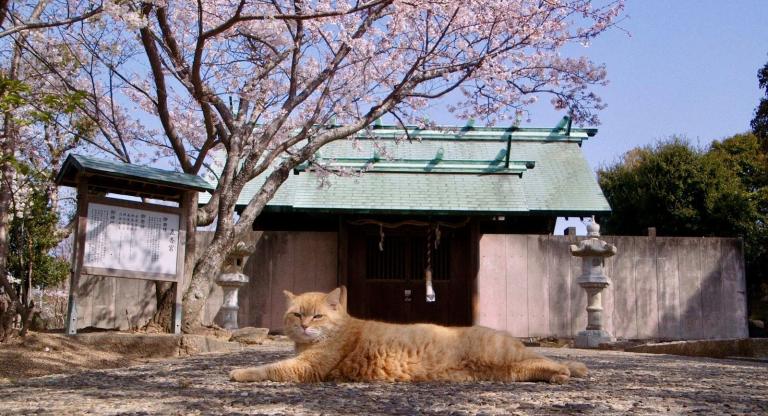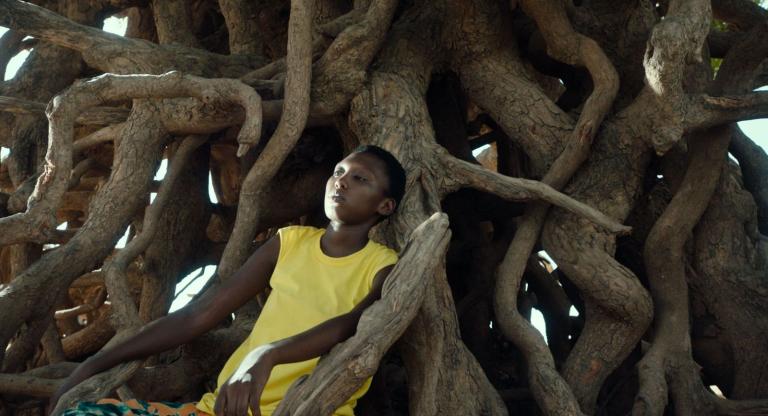In Farsi, the word joonam is a term of endearment shared between kin. Sierra Urich's documentary retains the word’s phonetic spelling in English for its title as a marker of hybridized identity. That transnational wrinkle foregrounds the filmmaker's navigation of the porous boundaries of language, culture, and history as she gleans a deeper understanding of her own identity.
Urich's mother, Mitra, left Iran after the revolution and married an American man, Gary, before settling in rural Vermont. Mitra's own mother, Behjat, and father followed their daughter 15 years later, when Sierra was four years old. Urich's trips to see her maternal grandparents in Massachusetts were frequent yet unfruitful, the limited grasp of their respective languages a hindrance to forging a stronger relationship.
Urich, who studied visual art before transitioning into filmmaking at the Rhode Island School of Design, has sought a corrective to that hindrance with her feature debut. The intimate conversations held between three generations of women in Joonam (2023) seek to make up for lost time. The myriad impacts of loss, not just of years but of land and language, gives the film's aesthetic occlusions a resonant immediacy. Urich's formalist control is subverted by the linguistic limitations and emotional guardedness of her subjects, as well as the geopolitical precarity of the relationship between Iran and the United States. The resulting film emblematizes the compromises and ultimata, both personal and artistic, made by children of the diaspora who yearn to see and love their families more fully.
Nick Kouhi: There's a rich surfeit of work by diasporic filmmakers today. Your film is participating in a broader dialogue that's dispelling stereotypes about what it means to have a diasporic identity.
Sierra Urich: When I began this project, it started in one place. But the more I thought about what I wanted this film to be the more I was thinking about how growing up I saw a handful of media that was about what it meant to be an immigrant or have an immigrant family. I never felt like I related to that. I knew there wasn't a lot of media out there that was about the next generation. Not necessarily, like, Here's my family who speaks one language at home, and then I go to school and I have my peers, and here's this sort of dual identity I have to lead. I was thinking about what happens when maybe it's not so much feeling like you have this bifurcated experience but this longing to have more of a connection to that homeland that isn't necessarily accessible for whatever reason.
NK: Talking about media, do you remember examples of films or poetry from your childhood that helped instigate an understanding of your Iranian heritage?
SU: My mom tried really hard to make it a part of my upbringing. She would always do a big Nowruz celebration and we would read Hafez around the haft-sin table. My mom is an artist herself, and she would write a lot of poetry [and] do a lot of Naskh and Ta’liq calligraphy painting. I was always around all these very beautiful aspects of the culture. But I think for me eventually it felt kind of surface level, like it was the decoration. I guess the word decoration is maybe not giving my mom enough credit for what she did. But it felt like my connection to Iran could only go so far. I was 10 years old when 9/11 happened and I was seeing a lot of stuff on television with the “Axis of Evil.” And then experiencing that Western narrative through my mother saying, “Say you’re Persian. Don't say you're Iranian just in case someone has some sort of prejudice against what Iran means.”
It wasn't until I went to college and moved to New York City and met other Iranians and other Iranian Americans who are not my family that I started to realize that there were different experiences that Iranian families were having. My family was saying, “You probably shouldn't go back. It's way too dangerous. Let's wait till the political situation gets better.” And I’d meet someone who’d say, “Oh, we go every summer! You should come stay with us in Tehran. We have an apartment.” As an older person, I felt really confused about what Iran was because I grew up with it as a mythology, almost like the lost city of Atlantis. It was so beautiful and tantalizing but just out of reach.
NK: What strategies did you adopt to navigate those contradictory accounts when making Joonam?
SU: Trying to get clarity on specific family stories of my grandmother growing up, my mother growing up, the family story about leaving Iran was a really tedious process made even more tedious by the fact that I couldn't communicate directly with my grandmother. My grandmother was in her eighties when I started this film, so there's a sense that the narrators are always somewhat unreliable, whether it's memory or embellishment or my inability to fully fact-check what was going on at the time historically because of who is writing which histories. But it became clear to me eventually that this film was more an emotional story about losing your home and about each of our different relationships to Iran, and I started to not care as much whether I was getting all the details correct or not. It's more this telling of displacement, of what it means to long for your home and also live in fear about being your authentic self because of where you come from. I feel like I got a better sense of where my mother and my family were coming from and this extreme sort of self-censorship and self-preservation that my family was going through in order to live and survive as Iranians in this world. It was uncovering what it means to grow up within the purview of an authoritarian regime.
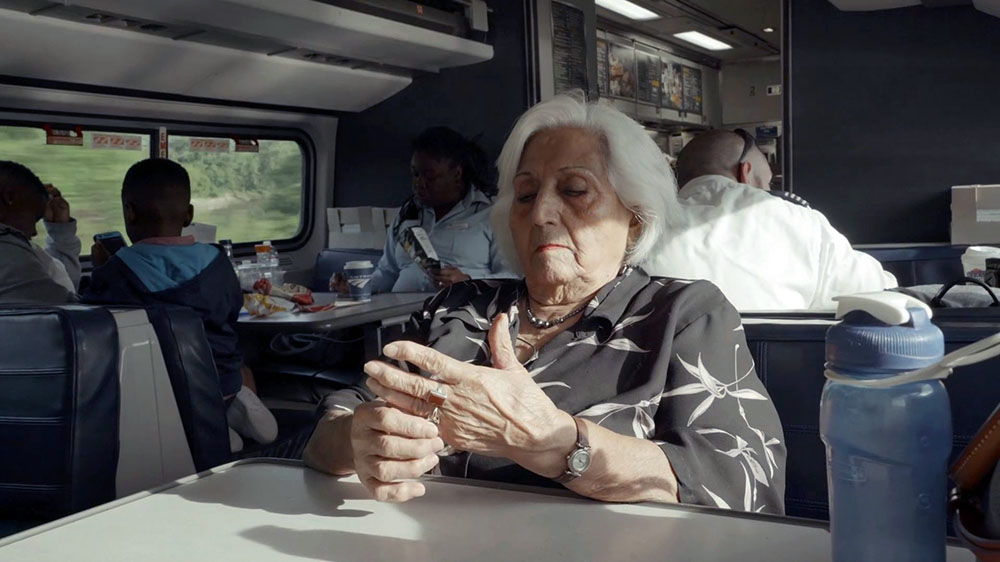
NK: There are several powerful contrasts in your film between your respective youths. For example, there’s a montage of archival footage you shot when growing up that then cuts to your grandmother talking about her experience at 15 years old when she was married and had to cope with her husband being away. Your childhood is visually documented, whereas your grandmother’s is orally recounted in both Farsi and Azeri, which on the level of language presents another set of challenges.
SU: When we were editing, it was always this challenge of how much information you needed from my upbringing and my childhood to put into perspective the ways that Sierra, the character in the film, is processing the generational differences of how her family grew up. We were experimenting with making this montage of all this home video footage that I recorded as a kid. We were just playing around, and this hard cut to my grandmother's story was kind of an experiment. But watching it back while we were editing, it was really moving for us.
There was also stylistically this question of how to visualize my grandmother's stories because there are very few photographs, and I went through many different ideas and iterations of what that could be, from animation to reenactments. What I eventually realized was that it was really important that my grandmother's stories weren’t always visualized because the audience is experiencing the whole film through my eyes. So when there is just a story, [I decided] to allow that to play out in the viewers’ imagination in the same way that, when I grew up, it played out in my imagination. When there's very little visual input you have to make your own mythology of your family's past.
NK: That ties into that moment where you're on Google Maps and you're trying to look up Ardabil [Behjat’s hometown] and you can't drop the little figure into the city.SU: Right. There were so many roadblocks. It was a frustrating process making the film and personally just trying to understand what this actual place is. Even finding a language teacher was difficult. There are far fewer resources to learn Farsi, and a lot of that is because of sanctions. There's no business incentive for people to learn Farsi in this country because of sanctions, and so it really hampers any sort of mass infrastructure or resources if you just want to learn. The people who are out there teaching Farsi right now are people who love the language or have some connection to the culture. But it doesn't necessarily create an ecosystem of mass resources for anyone to tap into.
NK: There are moments in the film where there’s a black screen and you're only seeing the subtitles translating the dialogue. It's like the absence of any visible image is itself serving as a conduit for the viewer to formulate their own picture. And when your grandmother is talking about a particularly painful family story, you retain the Farsi subtitles rather than translate them into English. I was curious to hear what led you toward those creative decisions.
SU: The subtitles are something that I wanted to play with from day one because I was filming alone with my family and had a very limited understanding of Farsi. I would always know topically what was going on but not the details of what was being said. It wasn't until a year later‚—sometimes longer, because I sent the footage out to get translated in chunks as I had money to do so—that slowly I was getting these transcripts back about what was actually being said. So it was really moving for me to watch the footage of my family, having a memory of what it was like to film all of that stuff and to see myself in the shot a lot of the time with the privilege of the future being able to read subtitles while watching myself not know what's going on. That was something that I really wanted to somehow translate to the audience, this experience that I was having where there were just so many barriers to me having this direct connection.
[In] that scene where my grandmother is talking about this family member who was martyred and my mother decided to leave [the room], I [had] lost my translator. [When I was editing,] I wanted the film to give the audience that same experience [I had] in the moment [that] my mom had to take a break and didn't want to be a part of that filming experience anymore. And because she left that also meant that I didn't get to find out the end of that story. So if you as a viewer aren't fluent in Farsi, you also don't get to find out the end of that story. Of course, it means something different if you do understand what's being said, but I really wanted the audience to have that experience of being shut out from something that you're so curious about.
NK: I thought it was also a respectful decision on your part, honoring your mother’s reticence in sharing that story. It’s a negotiation between how you can document a story while also respecting the wishes of your subjects, a tension that is prevalent throughout Joonam, but particularly in your relationship with your mother.
SU: It's difficult because whoever has the right to tell whose story is really complex when you’re family members. And maybe you don't agree on what should be told and what shouldn't be told. I wanted to honor my mother and her wishes but also honor my ownership of some of these histories. So it was this question of, as you said, how do we tell that story and give an impression of what's going on without necessarily crossing the line for things that my mom didn't consent to being shared.
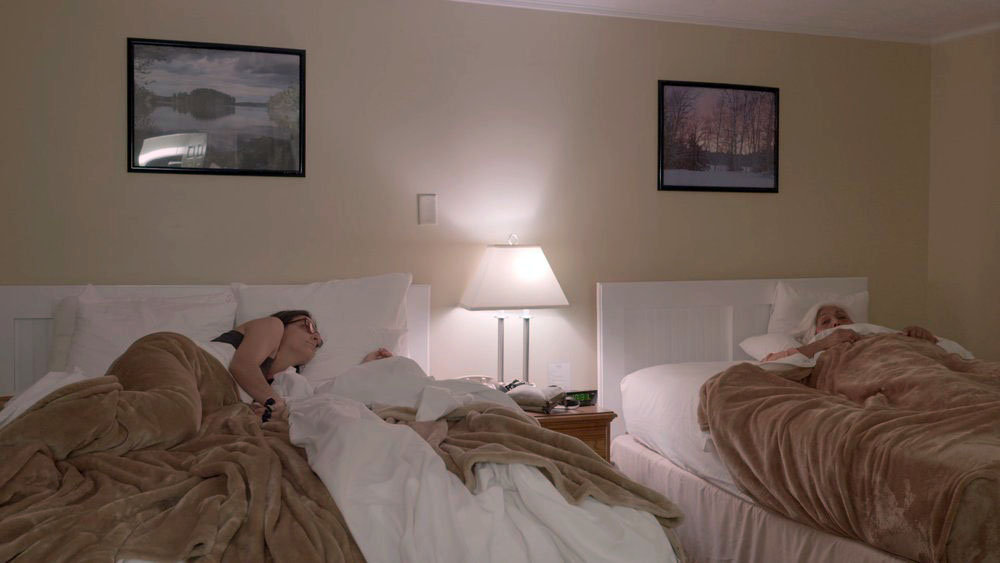
NK: Let’s talk about the role of music in the film, specifically about the thematic or narrative significance of some of the Persian music that we hear in the background or in the songs that your grandmother and mother sing together.
SS: My grandmother was very musical. She was always singing, and even in prayer, the type of praying that she would do was very musical. So I wanted that element in the film no matter what. The song that was always coming up when my grandmother was visiting, “Raftam ke Raftam,” she would be singing it. My mother would be singing it. And the lyrics literally mean, “I left, I left.” It's about a breakup, but it felt so poignant to the film that it's all about the loss of something that you love. So from the beginning, I really wanted that song to have a place in the film even though it's maybe kind of this cheesy old-timey love song.
This didn’t end up happening, but there was a period where I wanted to transpose that song into a country song. Because Vermont is a very rural place, you hear a lot of country music on the radio. And because country music is all about land and loss, I was thinking about those things a lot while I was making the film. Like, how can I use these different elements and then transpose them into something else that is like a diaspora version of “Raftam ke Raftam” based in the farm fields of Vermont? Those things didn't end up happening, but while I was crafting the film I was always thinking about how to weave the music into the experience of the film in terms of the metaphor of what the lyrics meant.
NK: You have multiple shots of the Vermont landscape and moments where your mom is tending her garden. There’s also an emphasis on the role of nature in your short film The Earth Grew Fleeting Eyes (2017) as a site of regrowth and replenishment. How does that topography of replenishment relate to a reclamation of cultural identity?
SU: Growing up a Vermonter, I grew up around a lot of nature. As an only child, too, it was a lot of playing by myself, climbing trees, and making up little stories in my head—just being outside. I think another part of it is maybe this idea of the connection to land and loss of land. That there's an experience as someone who's living in exile and diaspora of loss of culture or language, but there's also loss of physical land, and I felt myself continually questioning what it is I really wanted out of Iran. I kept on just thinking about the soil and the dirt and that I wanted to touch it, and I wanted to be there, and I wanted to be a part of the land itself, the nature itself.
There's this one shot in the film that sort of flies by of this jar of dirt on my mother's bureau that her family brought from their farmlands. I feel like there's a real importance there that's hard to articulate but it's about the physicality of a connection to a place, that it's real and you can touch it and it's not imaginary.
NK: My final question is about the ending of the film and how you and your editor, Maya Daisy Hawke, chose that to be your final sequence.
SU: That last scene is something that I was really embarrassed by for a long time. I didn't want my family to feel like I was attacking them or weaponizing the camera. When my mom and I got into that argument and I chose to keep filming and follow her with the camera, I felt really ashamed afterwards, and I almost deleted that footage. And for whatever reason I didn't. I just kept it on my hard drive. It wasn't until [nearly a year later] I got some feedback from a mentor of mine who said, “I watched your rough cut of the film. I feel like you're maybe holding something back. Is there some footage you’ve shied away from? It feels like in this version you’re avoiding something.”
And the first thing that came to mind was that footage. I got up the nerve to watch it with Maya. And it really changed my experience of that moment, watching it with her. [I saw] all these things [in] that moment I was so ashamed by, [but] she saw these other things. It was this much bigger argument about who gets to share what on film, who's the owner of what story. Sharing so much of yourself is uncomfortable, and as an Iranian sometimes it can be dangerous. Here I am as the younger generation being like, “No, just be natural! Open up.” That tension between [my mom] and I felt like the perfect metaphor for all the other tensions that we had about Iran and our identities. So it was a scene that I came to really love after watching it with [Maya], and we really wanted to find the right place for it. And then one day we just thought, “What if we ended the film with that?” And that scene just stuck.
Joonam screens through December 7 at Firehouse: DCTV’s Cinema for Documentary Film, its New York theatrical premiere. This evening and tomorrow afternoon, December 2 and 3, the film will be followed by conversations with director Sierra Urich. She will be joined by executive producer Arian Moayed and moderator Sanam Akhlagh this evening and by the journalists Yara Elmjouie and Yasmin Vossoughian tomorrow afternoon.
